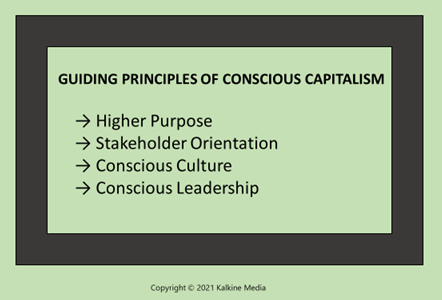Conscious Capitalism
Updated on 2023-08-29T12:01:37.726401Z
What is Conscious Capitalism?
Conscious capitalism is a philosophy created by Rajendra Sisodia and John Mackey. It recommends businesses operate more ethically by fulfilling the interests of all the stakeholders (customers, employees, investors, communities, suppliers, and government) impacted by business activities and not just the shareholders and company management.
Exercising conscious capitalism does not ignore or minimize the objective of profit maximization but encourages the absorption of all common interests in an organization’s business plan. It addresses the shortcomings of corporate capitalism.
It encourages the integration of the elements of conscious capitalism (like compassion, trust, value creation, and collaboration) with the aspects of capitalism (like competition, entrepreneurship, voluntary exchange, freedom to trade, and the rule of law).
Whole Foods Market, The Body Shop, The Container Store and Panera Bread are some of the examples of companies practicing conscious capitalism.

To guide a business for conducting ethical and socially responsible practices, conscious capitalism has introduced its four guiding principles:
- Higher purpose: Making money is essential for a business to sustain itself, but that need not be the only reason to sustain itself in the long run. A corporation must focus on a higher purpose by engaging, inspiring, and energizing its stakeholders. For a business to become a success in the longer term, it must provide true value to its stakeholders and not just maximize the shareholder’s wealth.
- Stakeholder orientation: The essential factors of a long-term business are society, partners, investors, customers, and employees. Value should be maximized for all stakeholders and not just the shareholders. These strong and engaged stakeholders can create a win-win situation for them as well as for the business.
- Conscious leadership: An organization and its business activities portray the leader's personality at the top. Conscious leaders acknowledge the higher purpose of the business and focus on harmonizing the interests and creating value for its stakeholders.
- Conscious culture: The principles, values, and practices of a business fill the company's atmosphere and connect the stakeholders with each other and to the business processes.
Summary
- Conscious capitalism is a philosophy that proposes businesses work ethically and fulfil the needs of their stakeholders.
- Rajendra Sisodia and John Mackey introduced conscious capitalism.
- Conscious capitalism introduced four guiding principles: Higher purpose, stakeholder orientation, conscious leadership, and conscious culture.
Frequently asked questions (FAQs)
- What is a conscious business?
A conscious business is a company led by a conscious leader that seeks not to harm but is rather aware of its actions' outcomes, and addresses the environmental and social problems with its business model. It serves a higher purpose beyond making a profit and considers all the stakeholders' interests. The drivers of conscious capitalism in a business are the triple bottom line and sustainability. The triple bottom line is:
- People: A conscious business attempts to do what is best for everyone -- the community, employees, customers, and suppliers.
- Planet: It focuses on minimizing its impact on the environment, sustainability, and replenishment of the ecosystem, for instance, reusing, recycling, using green energy, sustainable packaging, etc.
- Profit: As a business, it aims to maximize profit and proves corporations can be profitable without giving up on their values.
Sustainability, in simple terms, refers to meeting the current needs without compromising on future requirements. It originated in natural economics but, over time, has gained focus in social and economic development.
- How is corporate social responsibility different from conscious capitalism?
The key differences between conscious capitalism and corporate social responsibility are as follows:
- Corporate social responsibility (CSR) aims to contribute to societal goals by creating a foundation or implementing a community program. On the contrary, conscious capitalism focuses on the ongoing business processes and their impact on all the spheres, including environmental and societal.
- Conscious capitalism with its daily business activities accomplishes the social duties, whereas CSR is a separate operation or division in corporate capitalism.
- Businesses adopting the philosophy of conscious capitalism focuses on maximizing shareholder’s wealth and earning good profits by doing their business more ethically. However, CSR activities are viewed as a trade-off between social good and profit.
- Why is conscious capitalism essential for a business?
Companies are welcoming conscious capitalism as a business model because:
- High profits: According to Harvard Business Review, companies who cared about their stakeholders and practiced conscious capitalism have performed ten times better than their peers and competitors.
- Better employee productivity: Introducing conscious culture in an organization can act as a motivator to employees. Nowadays, employees are also attracted to advancement opportunities, social connections, and intellectual stimulation along with the paycheck from work. It also helps in fewer sick leaves, meeting the benchmarks, better customer service ratings, etc.
- Attracting customers: Customers are attracted to businesses that contribute to protecting the environment, treat their employees fairly, and help in improving the community.
- Brand visibility: Purpose-driven marketing increases a brand’s visibility more when compared to transaction-driven marketing.
- What is Conscious Capitalism, Inc.?
Conscious Capitalism, Inc. is a U.S.-based non-profit organization with a purpose to improve the perception and practice of capitalism. It helps business leaders to run their businesses in a conscious manner along with fulfilling the capitalism aspects. This is done by providing a network of support, access to ideas and information, and certified coaches and consultants.